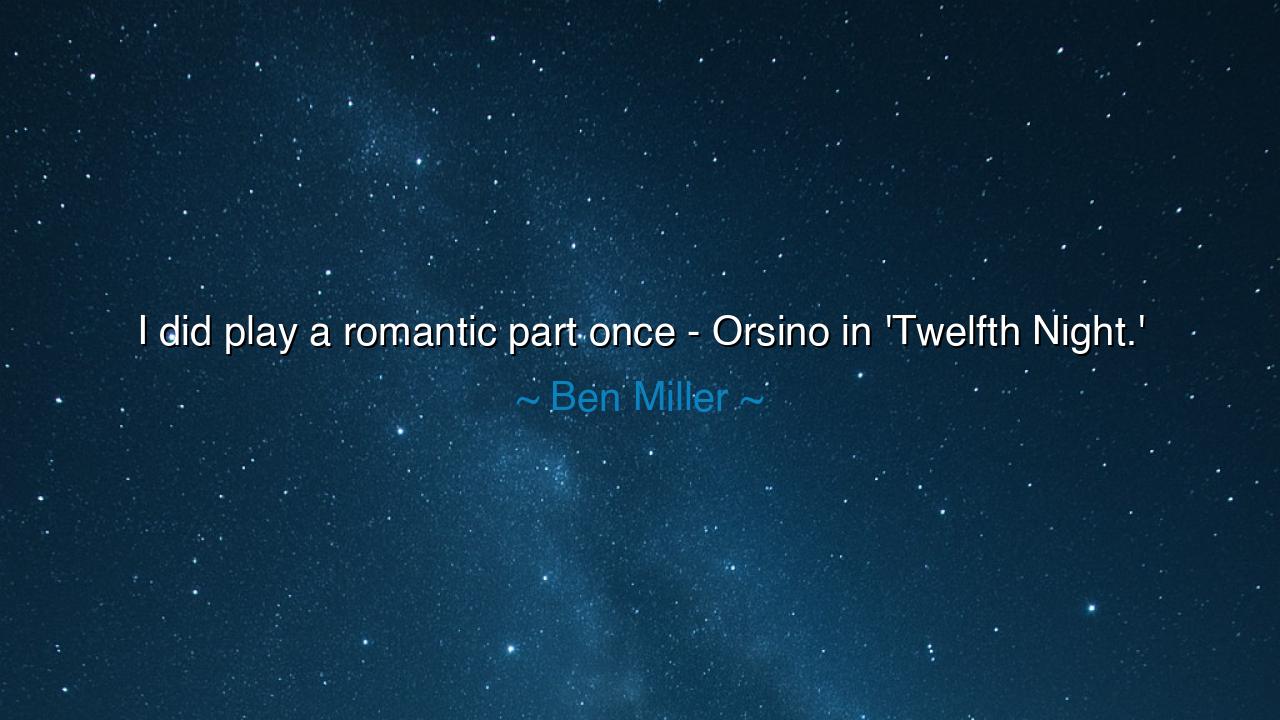
I did play a romantic part once - Orsino in 'Twelfth Night.'






Hearken to the words of Ben Miller, who once declared with quiet humility: “I did play a romantic part once – Orsino in ‘Twelfth Night.’” Though the phrase may seem light, even playful, within it rests a meditation on the nature of roles, identity, and the great masks we wear in the theater of life. For in this single remembrance, Miller does not merely recall a role upon the stage—he speaks to the timeless truth that to play the lover, even in art, is to step into humanity’s oldest dream.
Orsino, Duke of Illyria, is no mere invention of Shakespeare’s quill. He is the eternal figure of longing, of the heart that burns with desire, sighing, “If music be the food of love, play on.” He is the archetype of yearning that knows no satisfaction, the one who pursues beauty though it wounds him, and who learns in the end that love reveals itself not in fantasy but in recognition, in truth unveiled. When Miller recalls his turn as Orsino, he recalls stepping into this ancient current of human passion, playing the part of every man or woman who has ever loved with hunger in the soul.
For the stage is a mirror of life, and the roles we play are more than mere entertainments—they are vessels of wisdom. The ancient Greeks knew this, for in their tragedies, kings and beggars alike stood before the audience as teachers of destiny. When an actor dons the mask, he does not merely perform; he channels something beyond himself, something that belongs to all mankind. Thus, Miller’s recollection is not trivial. To have played Orsino is to have touched the essence of what it means to desire, to suffer, and to be transformed by love.
Consider the tale of Sarah Bernhardt, the great French actress of the nineteenth century, who dared to play Hamlet himself. In stepping into that role, she shattered conventions and showed the world that the truths of Shakespeare belonged not to one gender, nor one time, but to all humanity. She played the prince not merely as a man, but as the embodiment of doubt, grief, and the quest for meaning. So too, Miller’s Orsino is not merely a character of comedy; he is a symbol of how even those who are not known for romance may yet carry within them the capacity to embody it, if only for a time.
The lesson is clear: life asks each of us to play many parts. Some we welcome with joy, others are thrust upon us by fate. At times, we are warriors, at times, mourners. At times, we play the fool, and at times, we may play the lover. To reject these roles is to deny the fullness of life’s theater. To accept them, even if only once, is to learn more of ourselves and to taste the richness of existence.
Therefore, let us not fear the roles we are given, nor belittle them if they seem small. To play a lover, even in jest, may awaken the heart. To play a fool may teach humility. To play a king may remind us of responsibility. Each role holds wisdom, each mask reflects a fragment of the soul. As Shakespeare himself wrote, “All the world’s a stage, and all the men and women merely players.”
So, children of tomorrow, take this teaching to heart: do not shrink from the romantic part when life offers it to you, nor from the tragic, nor from the comic. Embrace the roles, for they are your teachers. Be bold enough to step into them fully, even if only once, and let them shape you into one who understands more deeply the human condition.
And thus, Ben Miller’s simple reflection becomes a timeless reminder: that even a fleeting moment on stage can echo with the wisdom of ages, and that to play Orsino—or any role of love—is to stand for a moment in the fire of life itself.






AAdministratorAdministrator
Welcome, honored guests. Please leave a comment, we will respond soon